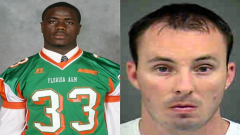 By Michael Gordon
By Michael Gordon
mgordon@charlotteobserver.com
A Charlotte-Mecklenburg police officer was indicted Monday on voluntary manslaughter charges linked to the shooting death of unarmed man.
A Mecklenburg grand jury returned the indictment against Police Officer Randall Kerrick after Superior Court Judge Bob Bell ruled earlier in the day that the 18-member panel could hear the case.
Kerrick, 28, was arrested Sept. 14 in connection with the shooting death of Jonathan Ferrell, 24. During a brief confrontation northeast of Charlotte, Kerrick fired 12 shots at Ferrell, hitting him 10 times.
But in an unexpected move, a separate grand jury voted last week not to indict the police officer on voluntary manslaughter charges, instead asking state prosecutors to bring back a lesser charge for them to consider. Of the 277 cases that grand jury considered, only Kerrick’s did not end with an indictment.
Attorney Roy Cooper quickly announced plans to take the case — and the original manslaughter charges – before the county’s other grand jury. Defense attorneys went to court to stop them.
But Bell said state law gives prosecutors authority to resubmit a case and a charge, clearing the way for an unsual second grand jury deliberation over what has become one of Charlotte’s highest-profile legal fights in years.
Kerrick is the first Charlotte police officer arrested in connection with an on-duty shooting in at least 30 years. If convicted he faces a prison sentence of between three and 11 years.
Demonstrators called for Kerrick’s indictment in an early morning rally. Attorneys for Ferrell’s family have described Kerrick as a “rogue cop” who committed “cold-blooded murder.”
The demonstrations and increasingly fiery rhetoric has led Kerrick’s defense team to question whether the grand jury can do an unbiased job.
“How in the world is that grand jury supposed to go into that courtroom and make a decision when you’ve also got the NAACP outside?” defense attorney Michael Greened asked Bell.
“How is Randall Kerrick supposed to get a fair trial and due process?”
Grand jury proceedings are closed. But only 14 of the normal 18 members were on hand to hear the Kerrick case last week. Twelve votes are needed for an indictment. That meant as few as three grand jurors could have turned the Kerrick vote. The final vote totals remain secret.
Senior Deputy Attorney General Jim Coman, who took over the case at the request of Mecklenburg District Attorney Andrew Murray, told Bell that if prosecutors had known ahead of time of the missing jurors, they would have rescheduled their case.
The fatal night
The shooting drew national headlines, in part because Kerrick is white and Ferrell was black.
Ferrell, a 24-year-old former college football player, had wrecked his car northeast of Charlotte after giving a co-worker a ride home. Autopsy reports indicate Ferrell had been drinking but was not drunk.
After kicking his way free of his car and apparently losing his cellphone, Ferrell walked to the nearest house and, according to police, pounded on the front door. The woman inside called 911.
Three officers responded. Ferrell ran up to them, ignoring police calls to stop, investigators say. One officer fired his Taser but missed. Ferrell then veered toward Kerrick, who fired 12 shots at Ferrell from close range.
The 28-year-old police officer, who had three years of experience at the time, was arrested the next day. Police Chief Rodney Monroe said a video from one of the police cars at the scene indicated Kerrick used “excessive force.”
Laughrun, who has described Ferrell’s death as tragic, said the video shows his client acted appropriately.
If convicted, Kerrick faces a prison term of three to 11 years.
‘Uncharted waters’
The legal ebbs and flows of the case have caught many veteran members of the legal community by surprise.
“This case is treading uncharted waters,” said prominent Charlotte attorney James Wyatt. “It’s very unusual to not return an indictment. It’s even more unusual for the attorney general to resubmit to the grand jury on the same charge.
“That raises some due-process concerns that are mentioned in the defense motion.”
Scheer and other former prosecutors say refiling charges is a common strategy, even if state law “technically” restricts the move.
In fact, Scheer said it’s possible that Laughrun and Greene’s motion could lead to Kerrick’s temporary release from the manslaughter charge, “but there is no block for the attorney general from taking the same charge back before the grand jury.”
Meanwhile, in a prepared statement Friday, attorneys for the Ferrell family said the latest move by Kerrick’s legal team lacks constitutional basis.
“It appears that this motion was filed solely because Officer Kerrick’s attorneys feel their client will be indicted once the full grand jury properly considers the evidence in this case,” the statement said.
Read more here: http://www.charlotteobserver.com/2014/01/27/4643483/judge-denies-effort-to-block-grand.html#.UubjcvZMGCY#storylink=cpy



